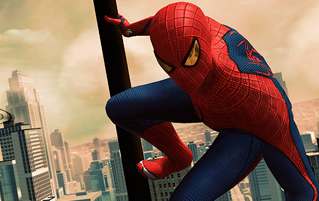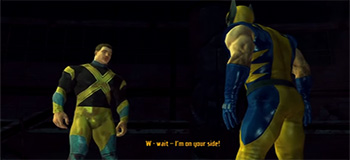5 Reasons Superheroes Make Terrible Video Game Characters

On paper, the superhero video game seems like a genre that would produce perfect blend after perfect blend of established characters and fun. Instead, we're forced to treat the good ones like an ex that, you know, just wants to chill, get dinner, and catch up. There's such an optimistic enthusiasm for games like the Batman: Arkham series, and everything seems to be going really well until we discover the latest Spider-Man misfire getting to second base with a bartender in the restroom.
They're Plan B pills that you take after a lifetime of enjoying a comic character, and they remove more fun than usual non-fun exercises in superheroes, like superhero puzzles or any Thor movie. Why do they hate us when we want so badly to love them? Well, for starters ...
They Often Present Lamer Versions Of The Movies

The two films in the Amazing Spider-Man series were a cold reminder to movie executives that no one really likes a movie universe if you take great pains to suck the charm out of it. At one point, the Spider-Man series was the most popular of all the superhero franchises, and the people behind the Amazing Spider-Man films did everything they could to make sure that that shit didn't happen again. The games based off of the Amazing movies do the same thing in relation to past Spider-Man games. They show so little indication that the creators know what makes Spider-Man cool that they may have been developed by J. Jonah Jameson.

"Sup. My name's Chad Parker. People who didn't like Batman V. Superman just couldn't handle how dark it was."
Just look at Peter Parker's stupid noggin. That's meant to resemble actor Andrew Garfield, but I don't know who thought Garfield would look best after having a larger skull shoved into his own skull. He doesn't have to look one specific way, but I start to question how much someone actually gives a shit about underdog Spider-Man when Peter Parker resembles the guy from your marketing course who always asks to borrow the notes you took in the last class.
These movie-based games can never muster up anything greater than "You're playing as a thing that has the same name as that thing you like! Isn't that enough for you goddamn nerds?" And if your idea of ultimate joy is knowing that the red-and-blue guy you're clumsily controlling on screen was in a movie you just saw, you'll dig them. If you need more to validate your purchase, they're like a visit from drunk Santa. On one hand, yay, Santa's here. On the other, Santa just puked into the back of his truck.

On Dasher. On Dancer. On Oxycontin.
I would much rather have a Spider-Man game with an uneven story that wasn't meant to fit into some larger movie plot than one that was. The earlier Spider-Man movie games fixed this by just presenting the movie plots with crazier shit added to them. You got to fight the Green Goblin after you fought his unlimited army of robots. The Amazing games are set before, during, and after the plots of the movies, and if this sounds like a weird way to produce enthusiasm for anything, then you are vastly over-qualified to write a new Spider-Man game. Superhero games love to do this, and they never fail to produce continuity errors in later movies, turning what should be an epic story into the time that the X-Men fought a giant robot and, oh wait, never mind, that didn't happen at all.
And since they're blindly trying to not ruin the continuity of a movie series, you end up fighting all of the villains that probably won't show up in the next film. This means that you get to fight guys like Mysterio, Kraven, Rhino, and fucking Scorpion (aka Spider-Man minus webs, plus tail) every few years. Studios are happy to pit you against Hammerhead in a game because they assume that they probably won't have to worry about shoving him into a movie until they reach Spider-Man 14.
But even superhero games with original stories fail, because ...
They're Too Focused On A Certain Gimmick

The cover of X-Men: Destiny prominently featured eight famous mutants on it, and you got to play as none of them. Instead, you got to "choose your destiny" and play as one of the three ambiguous primary colors on the bottom of the box. Sure, the X-Men and the Brotherhood of Evil Mutants make cameos, but "You get to talk to ... WOLVERINE" should only be a selling point if Hugh Jackman pops out of your TV to have breakfast with you.

Why PLAY as Wolverine, when you can CHAT with Wolverine? That's what the kids want these days.
Even if they do allow you to play as the first half of the title, somewhere along the line, the makers of superhero games decided that playing as a superhero in a functional, engaging way wasn't enough. No, the game really had to be about the internal struggle between good and evil, or about forcing you to play as different versions of the same character. I'm talking about Spider-Man games again for the most part, because between 2004 and 2014, we received the annual gift of a game that was only sort of about enjoying Spider-Man, and mainly about the different ways that they could get you to not play as regular Spider-Man.
What's so awful about regular Spider-Man that we're always asked to be a shittier version of him? When Amazing Fantasy #15 came out in 1962, was there a silent outcry of people who thought the comic would be way better if Spider-Man just left bystanders to die if he didn't feel like saving them? When I was 13, enraptured by Sam Raimi's Spider-Man, I never once thought "This is good, but what it's missing is more of Spider-Man being a needless dick to the innocent."

"With great power comes the ability to be an ass to anyone who's not as strong as you."
If I'm playing as Venom or wearing the black alien costume, sure, I'll beat villains to death if I have to, because I'm evil as hell. But if I'm playing as classic Spider-Man and the game gives me that tired "OH, THE CHOICES!!!" thing, I'm gonna rescue every civilian from every bomb threat in the five boroughs, because I'm Spider-Man, and when I'm Spider-Man, I do Spider-Man things. And when I'm playing something like Shattered Dimensions, I'm going to be disappointed whenever they interrupt my delight to make me control a goggle-wearing Spider-Man with fewer powers. Give that guy his own game so that I don't have to worry that I'm going to finish a normally-powered level, only to be thrust back into "noir" world where my strengths are sneaking around and quips, and my weakness is everything.

It's not wish fulfillment if I can survive more gunshots than the radioactive freak I'm playing as.
Batman: Arkham Knight had a ton of flaws, but when they plastered "BE THE BATMAN" on their box and promotional materials, they didn't mean it as "BE THE BATMAN, and maybe shoot some people if you feel so inclined." They meant it as "You get to play as Batman, the solemn After-School Detention Administrator of the comics world." But the worst game gimmicks aren't just reserved for dumb plot points ...
New Superhero "Technology" Is Overused

Batman: Arkham Knight was the first Arkham game that let you control the Batmobile, and that was great. You could even turn it into a tank and fight little enemy tanks, and that was pretty good as well. It also let you fight a villain (whom you had a much more satisfying boss fight with in a previous game) while you were both in your own tanks. That's not optimal, but it's better than nothing, I guess ...
But wait! It also let you solve Batmobile-specific puzzles with your car, which effectively turned the greatest piece of technology in DC Comics into a door-opening machine. Eh, I'm not so into tha- Hold on! You can also change the Batmobile to look like the one from Tim Burton's Batman, but they never programmed the tank parts of it, so you just get to drive around in it. Like Batman would! Except you were just driving a more capable Batcar, so instead of Burton/Batman nostalgia, all you get is the constant reminder that everything you love will eventually be replaced by something shinier.

Remember the feeling you had when you first saw Batman? You'll never feel that good again.
I love the Arkham series, but the later ones all have one massive downside that almost made me stop playing them for a few hours. As the game winds down, you're forced to use some kind of ludicrous weapon, like an ice-blasting Batarang or an electric shock grappling hook, in order to make it through an area, and it rarely improves the game. They take an hour to master and then 10 seconds to use, after which Batman forgets about them completely.
And such puzzles aren't difficult because they're inherently tricky; they're difficult because, as a player and as a Batman, I'm not going to be too adept at using the clunky item combination that I just invented. You can play through the game perfectly, and then die two dozen times at the end because the explosive accelerated line launcher consistently throws Batman into the various bodies of water that populate the basement of every asylum and factory in Gotham City rather than dropping him where he needs to go. Batman's greatest enemy isn't the Joker. It's whatever random voice-controlled hacking bomb he decided to scrap together that morning.

All aboard the Doom Train. Next stop: Right beside wherever you aimed.
When Everything Is Possible, Nothing Is Possible

The Arkham games have a pretty simple fighting system. You press a button in the direction that you want to spin kick (press another button first if the enemy has armor), and you watch as Batman jumps 40 feet to hit an attacker an entire building away. Batman can't swim, and he can barely manage or operate his own equipment in these games, but in a fist fight, he will do a triple flip if there's a skull to be crushed at the end of that last flip.
Sure, they offer you options like "As you glide down, you can fire three electric bolts, drop one smoke pellet, nine explosive pellets, and then do a sliding kick down the grate," but most of these can be replaced by just walking up behind someone and strangling them. And it works, because it's Batman, and if Batman didn't have ninja skills to counteract the fact that he's super stabbable, he'd just be a handsome guy with a nice computer. But in other superhero games, eventually you're gonna want to try out powers that go beyond "kick" and "kick twice." And the games do not make this easy for you.

Look, just improve my armor as much as you can and I'll hit "X" until the end credits.
They're surely available. Over time, you can unlock things like "web bomb" and "web shield" and "fury cut" and "advanced laser blast," but unless these can be accomplished in a situation where I'm still me, all I'll be using is "web shoot" and "standard laser blast." Usually, I'd say "I'm not bad" at video games, but "I'm not bad" in this situation could mean anything from "Trust me, I know how to turn the system on" to "Fear me, mortals, for among you walks your god." So in lieu of that, when it comes to video games, on the scale of The Dark Knight Rises to The Dark Knight, I'm Batman Begins: perfectly serviceable, but I take forever to get to any of the cool parts.
This isn't a problem in all superhero games. The X-Men Legends RPGs and the Marvel: Ultimate Alliance games were great about making sure that you could shoot a beam out of every character's every orifice with ease. But often, new "powers and skills" exist to just add one more item to scroll through on your way back to the most basic one. And that's if they don't require some intricate button combination to pull off. If there's a chance that my guy is going to spend minutes getting beaten up by goons while I frantically try to pull off his "Ultimate Shockwave" ability, I'll give up on the prospect of it entirely and just use "ground pound" -- a move that's put into Hulk video games to make me feel like my parents are proud of me.

I never became a doctor, Dad, but I did take out four enemies with one move. Can I come home for Thanksgiving, please?
They Don't Understand That Stuff's Still Got To Matter

Wanting video games to be more like movies will leave you with a bunch of cutscenes that you watch while waiting to mash something. I don't know who decided that quick time events were fun, but I hope that whoever eventually knees that dude in the ballsack screams "PRESS B!" before they do it. And wanting movies to be more like video games leaves you with the Resident Evil series. And as great as that series is, I don't need another one to prove to me that the things I like are stupid.
However, both mediums often forget that stuff has got to matter, regardless of genre. This goes double for superhero video games, which are parades of increasingly strong people whom you have to briefly interact with and then punch the shit out of. And villain parades are fun! A part of my brain will always respond positively and orgasmically to a genetic mutation bursting through a wall and shouting "It's Wolverine! Get 'em!" But I'd love to see if we can come up with something a little more gripping than the 10th remake of Spider-Man: Some Portal Thing Or Whatever.

Or Some Laser, Or Some Thing That Transforms People Into Versions Of The Main Villain, Or ..."
I don't think every superhero video game needs to tackle some weighty Tarkovsky existentialism. Injustice: Gods Among Us was fantastic, and the catalyst for every fight was "Hey asshole. We're in the same room." The aforementioned X-Men: Legends and Ultimate Alliance games are love letters to people who fist-pump whenever Moon Knight or Toad shows up. And despite the fact that this column could be re-titled "Shove Every Spider-Man Game Into A Rotting Butthole," Spider-Man's had a few good ones as well.
But despite the fact that we wish superhero movies would quit being about sad-looking dudes and just be an eternal stream of Guardians Of The Galaxy sequels, superhero video games could use some of that angsty gravitas sometimes. And if not that, at least the desire to craft a narrative that I'll remember a week later. Imagine a superhero game with the kind of gut punch ending that Red Dead Redemption had? Or the atmosphere of Bioshock? Or a superhero game that simply took the time and effort to rely on more than just audience recognition to float their plot and characters? Right now, the world knows that Superman fights a bald guy and is dumb. A video game that explores his world, allies, and villains would do wonders for his stagnant standing in pop culture.

He wouldn't even have to fly through rings ... that much.
Right now, studios are obsessed with creating big, interconnected Lego houses out of their superhero series. Video game studios could use this heightened interest in them to create great stories that aren't beholden to serving as a prequel to Thor 3 and a sequel to Dr. Strange. In the effort to create a bigger universe, all Hollywood has done is limit the range of stories that they can tell. Video games could pick up that slack. Or they could make Marvel Property: We Haven't Had One Of These This Year, So It's About Time. Whichever works. I'd probably buy both.
Daniel has a blog. He'd also like to thank talented YouTuber GodzillaMendoza for reminding him that all Spider-Man games are equal, but some are more equal than others.
See the insane video games that almost were in 6 Baffling Early Prototypes of Your Favorite Video Games, and find out which video game designs need to die in 4 Video Game Gimmicks Nobody Likes Anymore.
Subscribe to our YouTube channel, and learn how video game advertising lies right to your facehole in If Video Game Commercials Were Honest, and watch other videos you won't see on the site!
Also follow us on Facebook to unlock instant awesome.